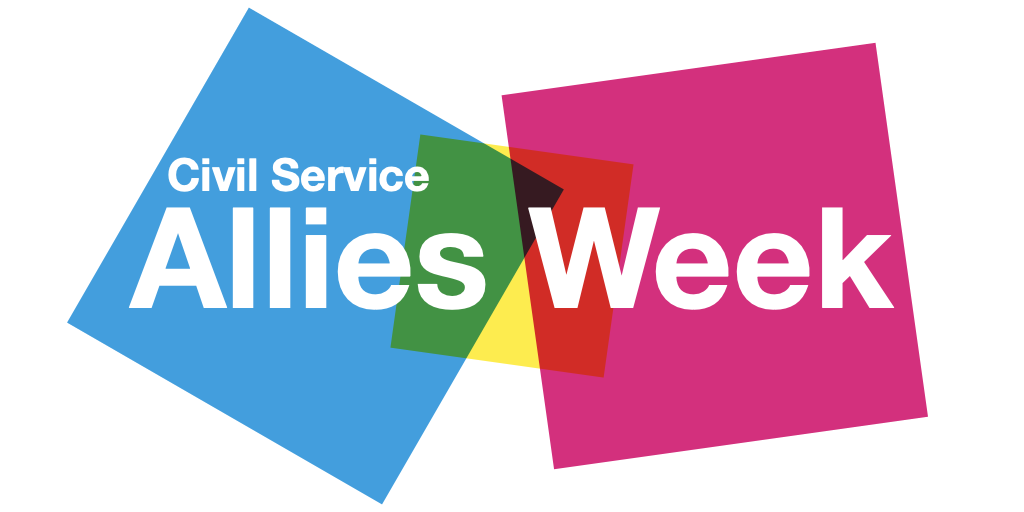It’s Civil Service Allies Week
This week, we’re celebrating the allies making the Civil Service a great place to work for LGBT+ people.

This week is Civil Service Allies Week. From 29 October to 2 November, we’ll be recognising the important role of allies in making our workplaces more diverse and inclusive.
As LGBT+ people, we are in a very small minority. That’s also true in the Civil Service. Based on responses to the Civil Service People Survey, we estimate up to 20,000 civil servants are lesbian, gay, bisexual or ‘other’1. We see and hear about LGBT+ civil servants doing fantastic work to make things better for people like them at work every day, but we also know that they couldn’t do all of that without support from people who don’t identify as LGBT+.
So we’ve set up Allies week, to thank those doing their part and to encourage more colleagues to step up and be active allies in their organisations.
Civil Service Allies Week posts
We’ll be posting new blog posts and resources all week. Keep checking this page for updates.
Updates so far
-
Civil Service Allies Week posters
We’ve created these posters for you to display in your office to help highlight Allies Week.
-
Allies in Action: Elaine Radburn
Elaine works for the Ministry of Housing Communities and Local Government. Here's what Elaine is doing do be a brilliant ally.
-
Allies in Action: Karen Notaro
Karen works for the Ministry of Justice. Here's why being an ally is important to Karen.
-
Allies in Action: Phil Blunden
Phil works for the Ministry of Defence. Here's Phil's thoughts on why allies are important.
-
Allies in Action: Raymond Jenner
Raymond works for the Ministry of Defence. In this post, we asked Raymond to share some thoughts on why allies are important.
-
Allies in Action: Caroline Hendrix
Caroline works for the Department for International Trade. In this post, we asked Caroline tells us what being an ally means to her.
-
Allies in Action: David Neale
David works in the Ministry of Defence. In this post, David shares why he thinks being an ally is important.
-
Allies in Action: Isobel Lowe-Zinola
Isobel works at the Department for Education. In this post, Isobel shares why being an ally is important to her.
-
Allies in Action: Keri Murphy
Keri works for the Department for Work and Pensions. In this post, we asked Keri shares what she's doing to be an ally.
-
Allies in Action: Sam Forster
Sam works in the Ministry of Justice. In this post, he talks about his role as an ally.
-
Allies in Action: Jacky Lawrence
Jacky works in the Asylum and Immigration Tribunal. In this post, Jacky shares what being an ally means to them.
-
Allies in Action: Nick Pett
Nick works at the Ministry of Defence. In this blog post, he tells us why allies are important.
-
Allies in Action: Pamela Rowlands
Pamela works for HM Courts and Tribunals Service. In this post, Pam shares some quick thoughts on her role as an ally.
-
Allies in Action: Sam O’Neill
Sam works for the Department of Work and Pensions. Here, Sam shares their thoughts on being an ally.
-
Allies in Action: Tom Read
Tom works for the Ministry of Justice. In this post, he shares some of his work as an LGBT ally.
-
Allies in Action: Joanne Osborne
Joanne works for the Department of Work and Pensions. In this post, Joanne shares some of her work as an LGBT ally.
-
Allies in Action: Paul Wilson
Paul works for the Ministry of Defence. In this post, Paul shares his experiences as an LGBT+ ally.
-
Allies in Action: Sara Daunton
Sara works for the Ministry of Defence. In this post, Sara shares some insights being an ally in the RAF.
-
Allies in Action: Ian Moore
Ian works for HM Prison and Probation Service. Here, Ian shares his thoughts on being an LGBT+ ally.
-
Allies in Action: Matt Baugh
Matt is a Director at the Department for Exiting the European Union, and an LGBT+ ally.
-
Allies in Action: Naomi Diver
Naomi works for the Environment Agency, and in this post, tells us about why she took part in Pride as an ally.
-
The People Survey included gender identity monitoring for the first time in 2017, but as this was an experimental question it doesn’t provide a good basis to make a wider estimate at the moment. ↩